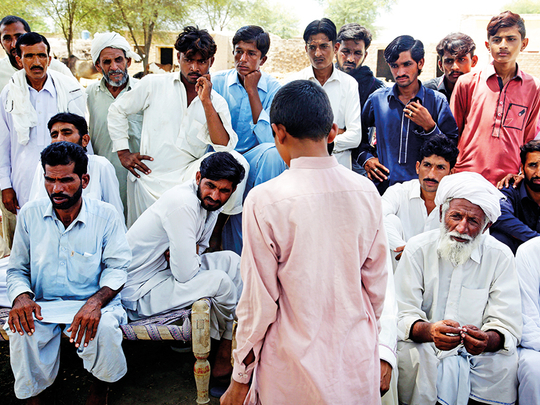
Islamabad: It began with sweets and pocket money when he was 10 years old — special attention from the religious cleric who ran the Pakistani madrasa, or Islamic school, the boy attended.
And it escalated to rape and months of sexual abuse, the now 28-year-old young man says.
“I feel rage now when I think after he raped me he took a bath and right away he left to lead the prayers,” the man, an economist who lives in Islamabad, told The Associated Press. “After that I came to know from three or four of my classmates that the mufti used to do the same with them.”
Speaking English, at times searching for the right words and at others apologising for the explicitness of his conversation, he described the cleric’s advances: how he took him to another mosque that was not associated with the madrasa the boy attended and then raped him.
He said he suppressed memories of the abuse for years, but after reading an AP report last month revealing widespread abuse by clerics in Pakistan’s thousands of madrasas, they all came tumbling back.
“I read the story two times. The first time I was shocked. The things that were written there were everything I had lived. The second time I read it, the whole of my body was trembling because of the memories it brought back,” said the man, speaking on condition of anonymity, not only because of the shame he felt nearly two decades later but because he feared Pakistan’s religious leaders could retaliate against him either with violence or charges of blasphemy or being an apostate, both of which, he said, were tantamount to a death sentence.
He decided to approach his former classmates, to rally survivors of abuse to band together to speak out. But, he said, he was rebuffed, and firmly.
“They said ‘Stop talking. This is not something to discuss.’ It is so common in the madrasas here, but people don’t want to talk about it. We are ashamed,” the young man said.
There are more than 22,000 registered madrasas in Pakistan, and many thousands of unregistered ones, often grimy one- or two-room facilities in remote villages. The millions of students they teach are often among the country’s poorest, who receive food and an education for free.
But at the madrasa this young man attended — one of the largest in the Pakistani capital, which attracted students from other parts of the country — many of his fellow students were, like himself, from middle- and upper-middle class families, “sent to the madrasa to win favour for the family from God,” he said.
Naeema Kishwar, a federal lawmaker who last year helped change Pakistan’s laws to close a legal loophole that had allowed those who commit so-called “honour killings” to escape punishment, said that laws exist to tackle sexual abuse of minors, which she called a scourge in Pakistan, not only in madrasas but in state schools, at home and among the army of child workers who are employed in homes as domestic workers and in factories.
“Of course, it is the responsibility of the federal government to prevent abuse of children, but you must remember that provincial governments are equally to be blamed for being unable to stop child abuse at all places, including private and government schools and madrasas,” she said. “This is a common problem.”
But Kishwar who is a member of the religious Jamaat-e-Ulema-e-Islam, a pro-Taliban party, took umbrage with a focus on sexual abuse in the madrasas. Her party operates thousands of religious schools. But like the clerics who dominate her party, Kishwar, despite data and evidence to the contrary, said the incidents of abuses in religious seminaries were isolated.
Taha Siddiqui, a prominent Pakistani blogger and journalist, who has come under attack by the military and intelligence agencies in Pakistan for his outspoken commentaries, said the AP report was widely shared on social media, whereas the mainstream media stayed mostly silent. He blamed fear among the mainstream media of antagonising the country’s religious leaders and because sex, even if it involves abuse, is a taboo subject.
“Such topics rarely get any coverage on national television channels. And for that reason, there were discussions on social media which were much more encouraging,” he said.
Two-time Oscar winner Sharmeen Obaid, whose documentaries have given a voice to victims of acid attacks and “honour killings” in Pakistan, retweeted the story.
Sherry Rahman, a senator in Pakistan’s upper house of Parliament and a close ally of Pakistan’s slain leader, Benazir Bhutto, tweeted: “This is a subject we need to talk about so our children are better protected. Sexual abuse of children is pervasive at many levels of society across the class divide. We must give courage and hope for victims to speak out.”
Raza Rumi, a Pakistani journalist and policy analyst, who moved to the United States after surviving an assassination attempt by members of the militant Lashkar-e-Janghvi group, tweeted: “This had to be said. For too long we have avoided confronting such brutalities ... End #child #abuse in #Pakistan.”
But there were also virulent attacks, said Siddiqui. Some accused those who criticised madrasas of blasphemy, while others said it was a Western conspiracy to defame Islam.












